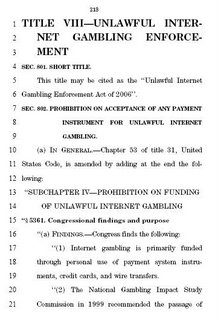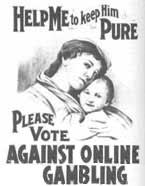Considering the Unlawful Internet Gambling Enforcement Act, Part II: Eliminating the Middle Man
Reading the analyses, surfing through the forums, and listening to the podcasts, one starts to realize a lot of people are simply echoing each other. A common refrain is that laws about online gambling have not changed here; rather, the Act simply outlines ways to enforce existing laws. I think that is mostly true, but not entirely. The fact is, while this reference to “a game based on chance” might seem innocuous at first glance, it does bring poker into the discussion. I. Nelson Rose claims that “The Act does not expand the reach of the Wire Act.” Allyn Jaffrey Shulman says “The new bill does not make online gaming illegal where it was not illegal before.” I believe both are underestimating the significance of this new, expanded definition of “bet or wager.” Those who are going to enforce this law -- and perhaps even those who interpret the law in court -- are going to include poker as an example of an activity prohibited by the Act.
As bad as that seems, what the Act says about actually enforcing laws prohibiting online gambling is even more worrisome. The UIGEA outlines measures to make it very difficult for American players to transfer money to and from online poker sites located outside the United States.
The Act outlines the responsibilities of “designated payment systems” (meaning banks, credit card companies, or any other money transfer system). These systems are here given 270 days from the date the bill is signed to implement measures to stop money from going to online gambling sites. Just how banks and credit card companies can monitor every single transaction in this way is unclear -- many observers have noted how impractical it would be to do so. (In truth, few Americans were sending money directly from their banks or credit cards to online poker sites anyway -- I certainly haven't been -- so this provision shouldn’t have much effect.)
The Act also speaks of “financial transaction providers” and places a similar onus on them not to help facilitate the transfer of money from Americans’ bank accounts to online gambling sites. Here the Act is referring specifically to third-party vendors like Neteller and Firepay. Rose wonders why such vendors -- all located outside of the U.S. -- would feel any obligation to comply with U.S. regulations. Shulman makes the obvious point that the U.S. government cannot arrest anyone in another country who breaks a U.S. law. Nevertheless, Firepay -- run by Canadian-owned FireOne -- has already announced that ten days after Bush signs the Act into law, they will no longer allow U.S. consumers to transfer money to or from online gambling merchants.
So . . . we have some poker sites still in operation. Full Tilt Poker made a statement they would remain in the game even after the Act becomes law. Poker Stars finally made a similar announcement last night. And Neteller has also said that since "it is currently unclear . . . how a European company, with no assets, presence or employees in the U.S., would be affected by this bill," that for them it shall be "business as normal."
So we’re okay, right? Business as normal, right? Shuffle up and deal . . . !
Hold on. There’s one other nasty little passage in this here Act that may prove to be the fly in the ointment. That mean little subsection about “interactive computer services,” a.k.a. Internet Service Providers (ISPs).
In part (c) of section 5365 (“Civil remedies”), we learn that federal agents can force ISPs to block access to online gambling sites, and even access to sites that link to online gambling sites. There it says the responsibilities of ISPs will be limited to “the removal of, or disabling access to, an online site violating section 5363 [i.e., an online gambling site], or a hypertext link to an online site violating such section.” It also says that the Act does “not impose any obligation on an interactive computer service to monitor its service or to affirmatively seek facts indicating activity violating this subchapter.” In other words, unlike banks, credit card companies, other “designated payment systems,” and even some “financial transaction providers,” the Act does not say that ISPs are going to have to police themselves. Nor does it say the ISPs are liable at all if their patrons are accessing such law-breaking sites.
Now on the face of it, this might seem harmless. ISPs don’t have to block sites unless the feds tell them to. So why should we worry? I can think of two reasons.
For one, the feds may well start telling them to. Again, a federal agency may have an easier time herding cats than tracking down each and every ISP hosting a site linking to an online gambling site. But given the letter of the law, I would not be at all surprised if we start to hear of some instances of this enforcement occurring. And woe to those of us affected.
Secondly, should the feds exert enough pressure on ISPs, we could possibly see some police themselves even though they haven’t been ordered to do so. This would be a most unfortunate turn of events. This might seem unlikely, but it wouldn’t be that different from what we have already seen with several poker sites (e.g., Party Poker, InterPoker & other Cryptologic sites, 888, Sun Poker, Titan, etc.) and now even a popular third-party vendor (Firepay).
I envision very little (really, no) recourse for the online player who suddenly discovers he cannot access his favorite online poker site. I also see the potential for problems for those who operate as affiliates to poker sites, and even sites like this one that provide links to online poker sites. If the ISP hosting this blog was told by federal agents to pull the plug on Hard-Boiled Poker -- or if the ISP decided to do so on its own -- there’s not much I could do about it. (Except perhaps go all "hard-boiled" and no "poker" . . . .)
Taking the law at its word, I will be able to link to sites like Interpoker and Party Poker that refuse U.S. customers, but if I were to link to any of those section 5363-violating sites like Full Tilt and Stars, my hosting ISP could be told to (or decide on its own to) block access to my site. Ironically, I could only link to sites where I cannot play, and not to sites where I do.
Eliminating the middle man like this is actually a common plot element in hard-boiled fiction. Usually sets up larger, more direct showdowns between the hero-shamuses and the villains later on. It won't take long, I think, after tomorrow's signing of the bill for us to see how effective this tactic will be for the feds. Then we'll see some real fireworks, perhaps even in the courts . . . .
Hopefully all of my fretting here is needless. But, like I said, we’ve seen some pretty extreme -- and utterly unexpected -- reactions already. In my final post considering the UIGEA, I want to address some of these responses -- the different ways poker sites have reacted to the passage of the Act and its imminent signing.
Labels: *the rumble, Allyn Jaffrey Shulman, Firepay, I. Nelson Rose, law, Neteller, UIGEA


 . (Again, 6-max limit HE, $0.50/$1.00.) First two players fold, the cutoff limps, and the button raises. The SB folds. I call the raise, as does the limper, so we’ve got three to the flop ($3.25 in pot).
. (Again, 6-max limit HE, $0.50/$1.00.) First two players fold, the cutoff limps, and the button raises. The SB folds. I call the raise, as does the limper, so we’ve got three to the flop ($3.25 in pot). 

 and the action is on me. Big Slick may be lurking. (I’ve written before about players making “
and the action is on me. Big Slick may be lurking. (I’ve written before about players making “ , a card I did not want to see. Even before the limper bets and the button raises, I was certain I was no longer in front. Now I’m caught in the chip sandwich -- if I call, I’m probably looking at more raises and ultimately putting in four bucks to see that river card.
, a card I did not want to see. Even before the limper bets and the button raises, I was certain I was no longer in front. Now I’m caught in the chip sandwich -- if I call, I’m probably looking at more raises and ultimately putting in four bucks to see that river card.  . Sweet sassy molassey. Your humble donkey bet out, was called by both players, and scooped $22.25 (giving fifty cents to the rake). Knowing full well I’d rivered them both, I didn’t even bother to look up what they had until today. Limper had
. Sweet sassy molassey. Your humble donkey bet out, was called by both players, and scooped $22.25 (giving fifty cents to the rake). Knowing full well I’d rivered them both, I didn’t even bother to look up what they had until today. Limper had 
 for the second-best straight. Button indeed had
for the second-best straight. Button indeed had 
 . Showing he’s a good sport about such things, the button typed “nh” to me. I responded shame-facedly: “not really, but thx.”
. Showing he’s a good sport about such things, the button typed “nh” to me. I responded shame-facedly: “not really, but thx.” 















